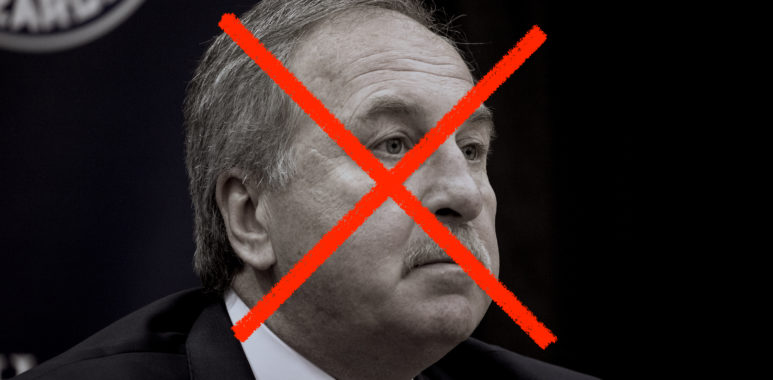
Playoff-Or-Bust mentality led to Grunfeld firing
The Washington Wizards fired now-former President of Basketball Operations Ernie Grunfeld on Tuesday afternoon through a statement quoting owner Ted Leonsis. Wizards fans, who had long called for Grunfeld’s departure, met the news with various levels of enthusiasm, yet almost universal relief.
Although Grunfeld’s critics like to suggest his tenure in Washington was a 20-year succession of swings-and-misses, many of his moves – even his recent ones – helped bring a winning franchise to DC. He drafted Bradley Beal and Otto Porter Jr. with the number three pick in consecutive years. He turned court jester JaVale McGee into Nene Hilario. Trevor Ariza and Paul Pierce both signed in Washington. Hell, the team came within one win of a conference finals berth in 2017.
But Grunfeld both failed to build a title contender and drove Washington into the ninth circle of salary cap hell. Dealing picks that could eventually have been below-market contracts never took the Wizards over the hump in the playoffs. Giving massive multi-year deals to Ian Mahinmi, Andrew Nicholson, Dwight Howard, and – more justifiably – Porter and John Wall, made getting over that hump impossible.
When it comes to identifying a route back to the NBA’s upper echelon, the Wizards may be as far off as any franchise in the league. With Wall’s $170 million supermax strapped to their payroll, even bottoming out or entirely clearing cap would be difficult.
But Grunfeld isn’t the only person to blame. Leonsis’ statement on the firing revealed an organizational vision – or lack thereof – almost inviting this level of failure.
The internet tycoon, now in his ninth year owning the Wizards (and the rest of the Monumental Sports portfolio), made his rationale clear:
“We did not meet our stated goals of qualifying for the playoffs this season and, despite playing with injuries to several key players, we have a culture of accountability and a responsibility of managing to positive outcomes.”
A hard expectation of playoff basketball provides a perverse incentive structure for any front office. That motivation showed in Grunfeld’s blunders over the last few years.
The Wiz came closest to championship contention in the 2016 offseason, when they nearly lured Al Horford to the nation’s capital. The center would’ve been Washington’s third star, but he chose Boston, who ironically knocked the team out of the playoffs the following spring.
No straight-line path to contention really existed for Washington other than their 2016 cap space. Unless Porter became an All-Star – always more of a thought experiment than a projectable outcome – the other roads to a title were laden with risks.
Dealing a godfather package centered around Porter or even Beal for, say, DeMarcus Cousins, may have enticed the Sacramento Kings in early 2017. But Boogie wasn’t some kind of sure-thing holy grail.
Cashing in on Wall before offering him his mega-extension was an option when it became clear this core’s ceiling was capped. But going younger and building around Beal, Porter, and trade assets would’ve meant taking an initial step backward and relying on two guys with much shorter track records of star-level performance.
Basically, any high-upside move would’ve come with substantial downside risk. Managing – nay, altogether avoiding – that downside risk appeared to be a clear directive from the franchise hierarchy. Grunfeld fiddled on the margins ineffectively, sacrificing future picks to get limited players like Tim Frazier, Trey Burke, and Bojan Bogdanovic. But his hands were tied when it came to the big decisions. Making the playoffs was the priority, even if it meant running on that dreaded treadmill of mediocrity.
Being merely “pretty good” is fine, of course, especially for a franchise for which losing was a decades-long habit. But being “pretty good” every damn year is also extremely difficult. And Grunfeld, in part because of the pressure to always reach the playoffs, wasn’t able to build a consistent winner.
This season, the year everything finally fell apart, the former exec dealt Kelly Oubre Jr. for a past-expiry Trevor Ariza. He declined to move valuable veterans like Ariza and Jeff Green even as the eight seed drifted away. Then he traded Otto Porter Jr. for two impending free agents of similar ages. He did all of this in a frantic bid to secure late April basketball while simultaneously (and miraculously) getting Leonsis out of the luxury tax.
The fact Grunfeld may have kept his job had he succeeded sends the wrong impression to future basketball ops staffers. Owners should judge team-building by the process more so than the results. And Washington sacrificed process long ago, in part because of Grunfeld’s inability to scheme creative acquisitions or properly evaluate back-of-the-rotation talent, but also because ownership had such a rigid desired result.
I don’t mean to suggest Leonsis is a uniquely damaging boss. He has a strong relationship with the team, and he’ll foot a tax bill if it means collecting more wins. He’s loyal and gives his employees ample job security. His Washington Capitals just won a Stanley Cup.
But an organization’s vision comes from the very top. And with Grunfeld or without, the Wizards are desperate for a new vision. The current one – playoff or bust – isn’t going to cut it.
